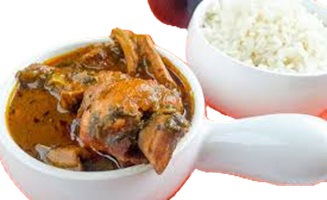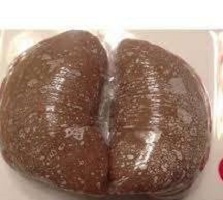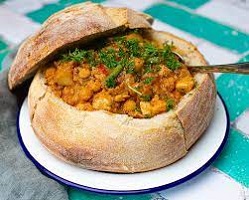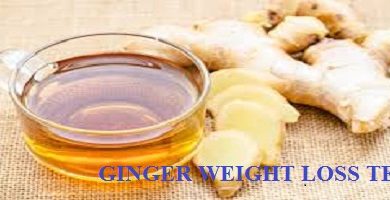Banga Fruit Stew: Ofe Akwu with Palm Kernel Soup
Banga Fruit Stew: Ofe Akwu with Palm Kernel Soup
The palm kernel is the edible seed found within the oil palm fruit, which produces two distinct oils: palm oil and palm kernel oil.

This fruit is a key ingredient in the well-loved Nigerian dish, banga soup or stew, also called Ofe-Aku.
If you haven’t tried Ofe Akwu served with boiled white rice, you’re missing out on a truly unforgettable culinary experience.
It’s a dish you must taste at least once in your lifetime; you’ll be hooked from the very first bite!
How to Cook the Best Ofe Akwu (Banga Stew): banga stew recipe
Ofe Akwu Ingredients: ingredients for banga stew
- 800g palm fruits (5 cups)
- 1kg (2.2lbs) beef
- 2 small seasoning cubes
- 1 small lump of ogiri okpei
- Habanero pepper (to your taste)
- 1 dry fish
- 2 smoked mackerel (Titus fish)
- 1-2 bulbs of red onion
- 2 tablespoons ground crayfish
- Scent leaves
Tools and Utensils You’ll Need
- Mortar and pestle: Essential for pounding the palm fruits. If you don’t have a mortar and pestle, here are some alternatives:
- Food processor.
- Stand mixer with a K-beater attachment.
- An empty wine bottle as a makeshift pestle and a pot as a mortar.
- Your hands, but I do not recommend this method since it requires handling very hot palm fruits, which can be painful.
- Knife and chopping board.
- Sieve.
Notes on Ofe Akwu Ingredients
- Palm Fruits: If fresh palm fruits are unavailable, use tinned palm fruit concentrate. However, the flavor won’t be as rich as when using fresh fruits.
- Ogiri Okpei: A traditional locust bean seasoning, different from Ogiri Igbo. If you don’t have Ogiri Okpei, you can skip it.
- Fish Substitute: Gilthead sea bream can be used as an alternative to mackerel.
- Onions: Red onions are highly recommended for their unique flavor, enhancing Ofe Akwu’s taste.
- Scent Leaf: This herb is unique to Nigeria and should not be substituted with mint, as mint will ruin the dish. If you can’t find scent leaf, parsley is a good substitute, and some people use basil, though it doesn’t quite replicate the original flavor.
Preparation Before Cooking Ofe Akwu
- Dry Fish: Soak in water to soften, then clean, debone, and break into small pieces.
- Onions: Chop finely.
- Ogiri Okpei and Pepper: Pound together in a mortar until smooth.
- Palm Fruits: Rinse and boil until soft, then pound in a mortar until the flesh forms a smooth pulp. Separate the nuts from the pulp, rinse the pulp in hot water, and set the thick concentrate aside to settle.
- Scent Leaves: Pick and slice the leaves.
- Mackerel: Smoke in the oven if not already done, then debone and break into large pieces.
Cooking Directions for Ofe Akwu
- Beef: Boil with seasoning cubes and half the chopped onions until cooked. For best results, grill the meat in the oven afterward.
- Palm Fruit Concentrate: Slowly pour into the pot, making sure not to include any unwanted sediments.
- Add Ingredients: Pour in the beef stock, grilled meat, dry fish, remaining onions, Ogiri Okpei, pepper, and crayfish.
- Cook: Cover and bring to a boil. Continue cooking until red oil begins to float on the surface.
- Final Additions: Add the smoked mackerel and scent leaves.
- Finish: Cover and cook until it boils again. Taste and add salt if needed.
Serve with boiled white rice or boiled yam.
Health benefits of Banga stew
1. Rich in Antioxidants
- Palm Fruit Extract: The palm fruit used in Banga stew is high in antioxidants like beta-carotene and tocotrienols (a form of Vitamin E). These antioxidants help protect cells from oxidative stress and reduce the risk of chronic diseases.
2. Heart Health
- Unsaturated Fats: Banga stew contains palm oil, which is high in monounsaturated fats. These fats can help lower bad cholesterol (LDL) levels and reduce the risk of heart disease when consumed in moderation.
3. High in Vitamins and Minerals
- Vitamins A and E: The palm oil in Banga stew is a good source of vitamins A and E, both of which are essential for maintaining healthy skin, eyes, and immune function.
- Minerals: The ingredients in Banga stew, such as fish and meat, provide essential minerals like iron, potassium, and magnesium, which are important for blood circulation, muscle function, and overall health.
4. Anti-Inflammatory Properties
- Locust Bean Seasoning (Ogiri Okpei): This traditional ingredient contains anti-inflammatory compounds that may help reduce inflammation in the body, potentially lowering the risk of inflammatory conditions.
5. Promotes Healthy Digestion
- Fiber Content: If the stew includes vegetables and spices, it can provide dietary fiber, which promotes healthy digestion and helps prevent constipation.
6. Protein-Rich
- Fish and Meat: Banga stew is typically made with fish or meat, both of which are excellent sources of high-quality protein. Protein is crucial for muscle repair, immune function, and overall body maintenance.
7. Boosts Immune System
- Vitamins and Antioxidants: The combination of vitamins, antioxidants, and immune-boosting spices in Banga stew can help strengthen the immune system and protect against infections.
8. Supports Bone Health
- Calcium and Phosphorus: Ingredients like fish contribute to calcium and phosphorus intake, which are vital for maintaining strong and healthy bones.
9. Potential Weight Management
- Satiating: Banga stew, being rich in protein and healthy fats, can be filling, which may help control appetite and support weight management when consumed as part of a balanced diet.
10. Cultural and Emotional Benefits
- Comfort Food: Beyond physical health, Banga stew provides a sense of cultural identity and comfort, which can have positive effects on mental and emotional well-being.
While Banga stew offers several health benefits, it’s important to enjoy it as part of a balanced diet, especially since palm oil is high in calories and should be consumed in moderation.



